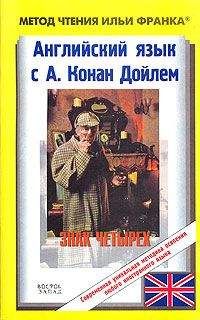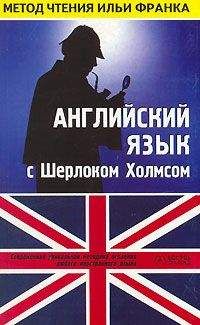occasionally [ǝˈkeɪʒ(ǝ)n(ǝ)lɪ], enough [ɪˈnʌf], carriage [ˈkærɪʤ]
IT was nearly eleven o'clock when we reached this final stage of our night's adventures. We had left the damp fog of the great city behind us, and the night was fairly fine. A warm wind blew from the westward, and heavy clouds moved slowly across the sky, with half a moon peeping occasionally through the rifts. It was clear enough to see for some distance, but Thaddeus Sholto took down one of the side-lamps from the carriage to give us a better light upon our way.
Pondicherry Lodge stood in its own grounds, and was girt round with a very high stone wall topped with broken glass. A single narrow iron-clamped door formed the only means of entrance. On this our guide knocked with a peculiar postman-like rat-tat.
"Who is there?" cried a gruff voice from within (кто там? — раздался грубый голос изнутри; gruff — грубый; неприветливый; хриплый).
"It is I, McMurdo (это я, Мак-Мердо). You surely know my knock by this time (ты, конечно, уже успел запомнить мой стук: «знаешь мой стук к этому времени»)."
There was a grumbling sound and a clanking and jarring of keys (послышалось ворчание, бряцание и скрип ключей; to grumble — ворчать; to clank — греметь; бряцать; to jar — издавать неприятный, резкий звук; дребезжать). The door swung heavily back (дверь медленно отворилась; to swing — качать; поворачиваться; heavily — тяжело; с трудом), and a short, deep-chested man stood in the opening (невысокий, коренастый человек стоял в проеме; deep — глубокий; широкий; chest — ящик; коробка; грудная клетка; to stand — стоять; opening — открывание; отверстие, дыра, проем), with the yellow light of the lantern shining upon his protruded face and twinkling distrustful eyes (/при этом/ желтый свет фонаря падал на его выступающее лицо и мерцающие подозрительные глаза; to shine — светить; to twinkle — блестеть, сверкать; distrustful — недоверчивый; подозрительный).
"That you, Mr. Thaddeus (это вы, мистер Тадеуш)? But who are the others (а кто остальные)? I had no orders about them from the master (у меня нет никаких распоряжений насчет них от хозяина)."
"No, McMurdo (нет, Мак-Мердо)? You surprise me (ты меня удивляешь)! I told my brother last night that I should bring some friends (я сказал брату вчера вечером, что я приду с друзьями; to tell — говорить, сказать)."
surprise [sǝˈpraɪz]
"Who is there?" cried a gruff voice from within.
"It is I, McMurdo. You surely know my knock by this time."
There was a grumbling sound and a clanking and jarring of keys. The door swung heavily back, and a short, deep-chested man stood in the opening, with the yellow light of the lantern shining upon his protruded face and twinkling distrustful eyes.
"That you, Mr. Thaddeus? But who are the others? I had no orders about them from the master."
"No, McMurdo? You surprise me! I told my brother last night that I should bring some friends."
"He hain't been out o' his room to-day, Mr. Thaddeus (= He hasn't been out of his room to-day; он не выходил сегодня из своей комнаты, мистер Тадеуш; hain't = ain't = am not, is not, are not, have not, has not — свойственная просторечию универсальная форма отрицания; добавление начального «h» там, где его не должно быть, или его выпадение там, где оно быть должно, — характерная особенность лондонского жаргона кокни), and I have no orders (и у меня нет никаких распоряжений). You know very well that I must stick to regulations (вы отлично знаете, что я должен придерживаться правил; stick — палка, прут; to stick — втыкать, вонзать; приклеивать/ся/; придерживаться). I can let you in (я могу впустить вас), but your friends they must just stop where they are (но ваши друзья должны остаться там, где они стоят)."
This was an unexpected obstacle (это было неожиданное препятствие). Thaddeus Sholto looked about him in a perplexed and helpless manner (Тадеуш Шолто оглянулся, озадаченно и беспомощно). "This is too bad of you, McMurdo!" he said (очень плохо с твоей стороны, Мак-Мердо! — сказал он). "If I guarantee them, that is enough for you (если я ручаюсь за них, этого должно быть достаточно для тебя). There is the young lady, too (к тому же с нами молодая леди). She cannot wait on the public road at this hour (она не может ждать посреди дороги в такой час; public — общественный; общедоступный)."
"Very sorry, Mr. Thaddeus," said the porter, inexorably (очень сожалею, мистер Тадеуш, — непреклонно сказал привратник; inexorably — неумолимо, непреклонно). "Folk may be friends o' yours, and yet no friends o' the master's (эти люди могут быть вашими друзьями, но не друзьями хозяина; folk — люди, определенная группа людей). He pays me well to do my duty, and my duty I'll do (он хорошо мне платит, чтобы я выполнял свои обязанности, и я их буду выполнять: «и обязанности я буду выполнять»). I don't know none o' your friends (я не знаю ваших друзей; = I don't know any of your friends; использование двойного отрицания свойственно просторечию)."
guarantee [ˌɡær(ǝ)nˈti:], inexorably [ɪˈneks(ǝ)rǝblɪ], folk [fǝuk]
"He hain't been out o' his room to-day, Mr. Thaddeus, and I have no orders. You know very well that I must stick to regulations. I can let you in, but your friends they must just stop where they are."
This was an unexpected obstacle. Thaddeus Sholto looked about him in a perplexed and helpless manner. "This is too bad of you, McMurdo!" he said. "If I guarantee them, that is enough for you. There is the young lady, too. She cannot wait on the public road at this hour."
"Very sorry, Mr. Thaddeus," said the porter, inexorably. "Folk may be friends o' yours, and yet no friends o' the master's. He pays me well to do my duty, and my duty I'll do. I don't know none o' your friends."
"Oh, yes, you do, McMurdo," cried Sherlock Holmes, genially (почему же, знаете, Мак-Мердо, — добродушно вскричал Шерлок Холмс; genial — веселый, общительный; добрый, доброжелательный). "I don't think you can have forgotten me (я не думаю, что вы могли забыть меня; to forget — забывать). Don't you remember the amateur who fought three rounds with you at Alison's rooms (разве вы не помните непрофессионала, который три раунда дрался с вами в комнатах Алисона; amateur — любитель; непрофессионал; спортсмен-любитель; to fight — драться; вести бой; round — круг; раунд) on the night of your benefit four years back (в ночь вашего бенефиса четыре года назад; benefit — выгода; бенефис)?"
"Not Mr. Sherlock Holmes!" roared the prize-fighter (неужели мистер Шерлок Холмс! — вскричал боксер; to roar — реветь, орать). "God's truth! how could I have mistook you (святая истина! как я мог не узнать вас; God's truth — святая истина, истинная правда; to mistake — ошибаться; принять за другого)? If instead o' standin' there so quiet you had just stepped up and given me that cross-hit of yours under the jaw (если бы вместо того, чтобы тихонько стоять там: «если вместо стояния там так тихо», вы просто вышли бы вперед и угостили бы меня этим вашим встречным ударом в челюсть: «под челюсть»; to step up — расширять, увеличивать; выходить вперед; cross — крест; поперечный; встречный; hit — удар), I'd ha' known you without a question (= I'd have known; я бы узнал вас без вопросов; to know — знать, узнавать). Ah, you're one that has wasted your gifts, you have (а, вы растрачиваете: «вы тот, кто растратил» свой дар, точно; to waste — терять даром; упустить, не воспользоваться; gift — подарок; дар, талант)! You might have aimed high (вы могли бы рассчитывать на успех; to aim — целиться; стремиться; метить; to aim high — метить высоко), if you had joined the fancy (если бы стали профессионалом; to join — соединять; присоединяться; fancy — иллюзия; галлюцинация; the fancy — бокс, искусство кулачного боя)."
genially [ˈʤi:nɪǝlɪ], amateur [ˈæmǝtǝ], fought [fɔ:t], waste [weɪst]
"Oh, yes, you do, McMurdo," cried Sherlock Holmes, genially. "I don't think you can have forgotten me. Don't you remember the amateur who fought three rounds with you at Alison's rooms on the night of your benefit four years back?"
"Not Mr. Sherlock Holmes!" roared the prize-fighter. "God's truth! how could I have mistook you? If instead o' standin' there so quiet you had just stepped up and given me that cross-hit of yours under the jaw, I'd ha' known you without a question. Ah, you're one that has wasted your gifts, you have! You might have aimed high, if you had joined the fancy."
"You see, Watson, if all else fails me (вот видите, Ватсон, если все остальное не будет мне удаваться; to fail — недоставать; потерпеть неудачу) I have still one of the scientific professions open to me," said Holmes, laughing (передо мной всегда открыта одна из этих научных профессий, — сказал Холмс, смеясь). "Our friend won't keep us out in the cold now, I am sure (наш друг больше не будет держать нас на холоде, я уверен)."
"In you come, sir, in you come, — you and your friends," he answered (заходите, сэр, заходите — вы и ваши друзья, — ответил он). "Very sorry, Mr. Thaddeus, but orders are very strict (сожалею, мистер Тадеуш, но приказ очень строгий). Had to be certain of your friends before I let them in (должен быть уверен в ваших гостях, прежде чем впускать их)."
Inside, a gravel path wound through desolate grounds to a huge clump of a house (за стеной: «внутри» посыпанная гравием дорожка вела по запущенному участку к громаде дома; to wind — виться, извиваться; desolate — одинокий, заброшенный; запущенный; унылый; clump — заросли; глыба, ком), square and prosaic (квадратного и без причуд; prosaic — прозаический; неинтересный, скучный), all plunged in shadow save where a moonbeam struck one corner and glimmered in a garret window (погруженного в тень, за исключением одного угла, на который падал луч луны, да лунных отблесков в чердачном окошке: «весь погруженный в тень, кроме как где лунный луч освещал один угол и мерцал в чердачном окошке»; to plunge — нырять; погружаться; save — за исключением, кроме; to strike — ударять/ся/; случайно встретить; to glimmer — мерцать). The vast size of the building (от обширности мрачного здания: «обширный размер здания»), with its gloom and its deathly silence (погруженного в мертвую тишину: «с его мраком и мертвой тишиной»; gloom — мрак; темнота; мрачность; уныние), struck a chill to the heart (холодом веяло по сердцу; to strike — ударять/ся/; вселять; chill — простуда; гнетущее, давящее чувство). Even Thaddeus Sholto seemed ill at ease (даже Тадеушу Шолто, казалось, было не по себе; ill at ease — не по себе), and the lantern quivered and rattled in his hand (и фонарь дрожал и дребезжал в его руке; to quiver — дрожать мелкой дрожью; to rattle — трещать, грохотать; дребезжать).



